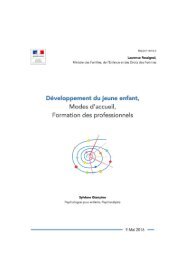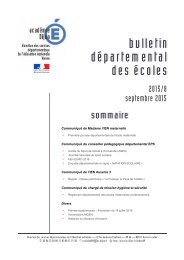agrl_innovations_in_ssa.pdf?utm_content=buffercb41d&utm_medium=social&utm_source=twitter
agrl_innovations_in_ssa.pdf?utm_content=buffercb41d&utm_medium=social&utm_source=twitter
agrl_innovations_in_ssa.pdf?utm_content=buffercb41d&utm_medium=social&utm_source=twitter
You also want an ePaper? Increase the reach of your titles
YUMPU automatically turns print PDFs into web optimized ePapers that Google loves.
Foreword<br />
Sub-Saharan Africa (SSA) faces critical challenges with more than 40 percent of its population<br />
liv<strong>in</strong>g on less than US$1 per day and one <strong>in</strong> three people be<strong>in</strong>g undernourished. Yet, agriculture<br />
be<strong>in</strong>g the largest employer of labour <strong>in</strong> Africa, responsible for over half of export earn<strong>in</strong>gs has<br />
the potential to play the major role <strong>in</strong> the cont<strong>in</strong>ent’s development. Agriculture underp<strong>in</strong>s the<br />
livelihoods of over two thirds of Africa’s poor and assumes even greater importance <strong>in</strong> the<br />
cont<strong>in</strong>ent’s poorer countries. Unfortunately agricultural productivity especially <strong>in</strong> SSA has been<br />
stagnat<strong>in</strong>g for many years. Low levels of land and labour productivity have meant that per capita<br />
agricultural production has fallen over the last four decades. Although agricultural research<br />
has generated many technologies with the potential to address this situation, their impact on<br />
productivity, livelihoods and quality of life has been disappo<strong>in</strong>t<strong>in</strong>g. Among the many reasons for<br />
poor agricultural performance the way <strong>in</strong> which research has been undertaken is a key.<br />
To redress this, the Forum for Agricultural Research <strong>in</strong> Africa (FARA) has promoted the<br />
<strong>in</strong>tegrated agriculture research for development (IAR4D) approach based on an <strong>in</strong>novation<br />
systems framework. This br<strong>in</strong>gs together multiple actors along a commodity value cha<strong>in</strong> to<br />
address challenges and identify opportunities to generate <strong>in</strong>novation. The approach creates a<br />
network of stakeholders or partners who are able to consider the technical, economic, social,<br />
<strong>in</strong>stitutional, and policy constra<strong>in</strong>ts <strong>in</strong> an environment. The network facilitates research and<br />
learn<strong>in</strong>g that not only generates new knowledge, products or technologies, but also ensures the<br />
use of research products. The IAR4D approach is be<strong>in</strong>g tested at three pilot research sites across<br />
SSA: <strong>in</strong> Eastern and Central Africa around Lake Kivu (Democratic Republic of Congo, Rwanda<br />
and Uganda); Southern Africa (Malawi, Mozambique and Zimbabwe); and West Africa (Niger<br />
and Nigeria). This has <strong>in</strong>volved the establishment of 36 stakeholder <strong>in</strong>novation platforms thus:<br />
creat<strong>in</strong>g functional l<strong>in</strong>kages between farmers, the private sector, and service organizations;<br />
<strong>in</strong>tegrat<strong>in</strong>g productivity, natural resource management, markets and policy; establish<strong>in</strong>g<br />
effective mechanisms for organiz<strong>in</strong>g and learn<strong>in</strong>g processes for farmers; and ensur<strong>in</strong>g action<br />
research oriented toward problem-solv<strong>in</strong>g and impact. There are strong <strong>in</strong>dications that IAR4D<br />
is an effective concept, applicable across a broad spectrum of agricultural systems.<br />
FARA is, however, aware that there have been a few success stories <strong>in</strong> the agricultural sector<br />
across SSA, where multiple stakeholders have worked closely together to foster agricultural<br />
<strong>in</strong>novation. Document<strong>in</strong>g and identify<strong>in</strong>g the reasons for these successes can further enhance<br />
the usefulness of <strong>in</strong>novation systems approaches.<br />
This is why FARA undertook this study to further stimulate discussion and understand<strong>in</strong>g of<br />
how IAR4D and <strong><strong>in</strong>novations</strong> systems approaches can be used to address the need to <strong>in</strong>crease<br />
agricultural productivity <strong>in</strong> SSA, <strong>in</strong> ways that will improve the livelihoods and quality of life for<br />
Africa’s smallholder farmers.<br />
Monty Jones<br />
Executive Director, FARA<br />
3






